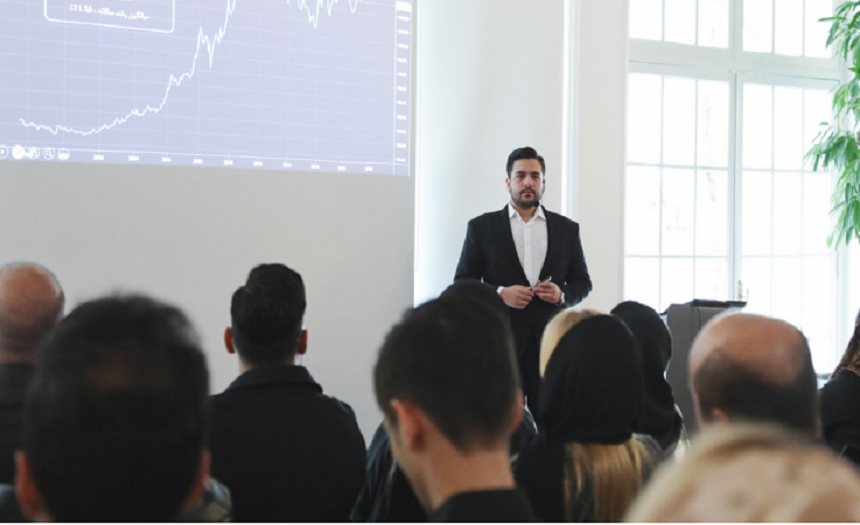By: AmirHesam Zonoubi

AmirHesam Zonoubi, Chief Financial Analyst and Head of the ICEBERG Analytica Research Institute
As a developing country, Iran is continuously making an effort to closeted distance between its development and progress rate in various areas with that of the first world. But such objectives have failed to materialize due to a series of limitations stemming from its ideological and role-based approach often manifested in the form of opposing policies to Western interests. Examples of such policies are the country’s strategic role in the Middle East and Mediterranean region or its adoption of military or political policies opposing that of the neighboring Arab countries often with common interests, especially in regard to issues like the conflicts in Yemen, Iraq, and Syria.
Accordingly, Iran’s struggle to achieve relevant economic and commercial infrastructure has proved impassable, and has ended up being the unfortunate title bearer of the country with the strictest sanctions in history. The bulk of these economic sanctions led by Western industrial nations have targeted the country’s finance and transaction channels. Western countries have long employed such methodology as leverage aimed at bringing Iran to the negotiation table, and they have pursued this objective by placing extreme pressure on the country’s financial sector, essentially crippling its commercial and economic endeavors. At first look, the obvious outcome of such economic pressure might only be visible in the country’s banking and commercial insurance agencies’ financial transactions. But a more in-depth look at the current situation reveals how these sanctions have created an unusual financial and debenture environment and, consequently, bred numerous fraudulent and unhealthy businesses. These deceptive businesses in turn have been taking advantage of the public’s ignorance of financial matters, as people have been barred from participating in the world financial system for over 45 years. This article puts forth the five biggest financial scandals and frauds that have taken place in Iran since the beginning of the sanctions, mainly due to the severing of the country’s connection to the global economy and the international credit rating system.
Financial and Credit Institutions
Financial and credit organizations and any other establishment providing financial services or doing business in the money and credit arena in the developed world are obliged to submit their complete financial records to government or privately held supervisory watchdogs and credit rating agencies whose task is to validate the accounts by creating a more transparent financial system and thereby preventing financial crises and systematized fraud. The 2008 Credit Crisis in the United States proved the necessity and importance of such supervisory and credit rating agencies. Given the wide range of options available to these financial institutions for the purpose of crafting leveraged or credit building products, creating pseudo cash or virtual currency, and issuing of securities, their supervision is of utmost importance, the most important reason of which is the safeguarding of their investors’ assets by preventing such organizations from defaulting on their financial commitments.
Unfortunately, there is no bulletproof guarantee when dealing with such institutions. Even in developed countries, some financial companies have taken advantage of their credit ratings and financial power to create fiat currencies through debentures or bonds with unrealistic rates. Or they have conceived of financial vehicles at double or triple their available assets using non-existing warrants or guarantees through complex financial investment securities. Unfortunately, when the time comes to pay up these loans or show the true value of the assets the investment company owns, they default, and if they are a major financial institution with billions of dollars in default, they start a domino effect ultimately ruining the country’s economy and causing a national financial crisis. Iran, too, has not been spared such unfortunate events, and in the face of an unsupervised environment where there are no domestic or international credit rating agencies to investigate the financial transactions of such financial institutions and consequently ensure the transparency and legality of their activities and protect the consumers’ rights, the country has seen an alarming number of default cases and social crises that have often resulted in huge financial scandals.
General Partnerships
It was first in the 1990s that the Central Bank of the Islamic Republic of Iran, along with other governmental financial supervisory institutions, began granting licenses to companies as cooperatives and general partnerships. Such licenses allowed these companies to participate in domestic and international financial investments through raising funds from the general public. In the early years of the initiative, the Central Bank’s requirements and guarantees for certification of such companies were surprisingly arbitrary and irresponsible, and as such a great number of cooperatives and partnerships were registered in a short period of time. Each of these newly emerged general partnerships attempted to attract investment from the public under a different guise and gimmick and with little effective oversight of their financial records, a massive financial crisis was soon created.
This crisis served as a waking call for the Central Bank, which decided to increase the required guarantees manifold to prevent future systematic fraud by these so called general partnerships. Interestingly, most of these newly formed companies were engaged in currency exchange activities and had nothing to do with the economic sector of the country.
 Privately held Financial Institutions
Privately held Financial Institutions
In the early 2000s, a great number of cooperatives that active in different kinds of commercial and economic operations managed to obtain temporary licenses as financial institutions from the country’s Central Bank. Promising investors bogus monthly interest rates of 2.3 – 3.5 %, these institutions quickly amassed billions of dollars in assets. Eventually though, and after decades of being in operation and embezzling people’s assets under the guise of investments, the Central Bank demanded these fraudulent institutions to surrender their financial records to authorities within a deadline.
As most of these so-called investment cooperatives were involved in the creation of fake currency and money, and were basically running a Ponzi scheme, this sweeping failure to comply with the Central Bank’s demand led to the bankruptcy of almost all privately held financial institutions that had mushroomed overnight. Moreover, as a result of this nationwide bankruptcy of sham investment companies, millions of Iranians lost their investments and with that, their livelihood.
This widespread public letdown in itself turned into an even greater social crisis as people tricked out of their investments now protested in mass in front of government buildings such as the presidential administration building and the parliament. These protests went on for years until a considerable inflation wave hit the country. Ironically, as a result of the high inflation, the value of real estate and stocks held by the bankrupt institutions in various companies had increased significantly and had consequently boosted the value their overall capital. Seizing these assets as collateral, the Iranian government, with the backing of the judiciary branch, paid off the debt of these cooperatives with complete disregard to the rampant inflation, thereby effectively putting an end to the link between the protests and these financial institutions. This debt relief changed the nature of the default committed by these institutions from a social crisis to a categorical financial fraud case.
Pyramid Schemes
Goldquest first found its way into Iran in the early 1980s by concocting an international scam designed for selling gold coins for twice their actual value. Iranians were unfamiliar with such systematic pyramid schemes at the time, and millions fell in the trap.
Goldquest was the first hoax company of its kind for the Iranian government, and according to various watchdog organizations, the company alone managed to embezzle 12 billion dollars’ worth of investors’ money out of the country in just five years. This figure was astonishingly twice the amount of Iran’s development budget at the time and the incident could be easily regarded as a terrible financial and credit blow to the country by any accounts. On top of such a daunting financial failure and social disturbances that resulted from people’s involvement is such schemes, at the time and as a consequence of the Iran-Iraq war,
Iran was also struggling with rife unemployment in the 1980s and 90s. Eventually the Iranian government took action and declared illegal any involvement with GoldQuest and other similar pyramid schemes that were experiencing a mushroom-like growth in the finance and credit sector of the country at the time.
Further, the government criminalized any type of involvement with unlicensed companies and even adopted the death penalty policy for the leaders of such companies.
The decree proved effective for a limited, and thousands of offices involved in the scheme throughout the country were shut down through legal action. In this way the authorities were able to mitigate the situation and control the crisis to some extent. In the years after GoldQuest, its leaders fled to neighboring countries and from outside Iran hatched similar schemes and attempted to execute other systematic frauds, schemes that unfortunately have proved popular among Iranians due to the country’s poor economic situation and an existing unhealthy environment caused by strict sanctions. These pyramid schemes that started off as the sales of special offer products eventually culminated in Ponzi investment schemes in the 2010s. Some of these fake projects claim to offer investment opportunities in innovative scenarios giving an alluring monthly interest rate of up to 8% in dollars, or they operate through robot traders in fake international financial markets. A major goal of financial operators working in Iranian organizations who conduct legitimate commercial and economical businesses is the raising of public awareness on the issue of fraudulent financial ploys, and the implementation of stricter legal regulations by the government against criminals. The reality is that luring of public capital toward unhealthy channels, especially given the increasing hype in the still opaque cryptocurrency market, hurts legitimate financial institutes most.
 Online Gambling Sites
Online Gambling Sites
According to the Sharia law currently in place in the Islamic Republic of Iran, any type of gambling is against the law. A such, any attempt toward legalization of gambling services will be in direct conflict with the country’s Constitution. Nonetheless, numerous illegal gambling structures have been formed in across the nation in the last 40 years, first in the offline world and then, beginning in the early 2000s, moving to the online world.
These arrangements are often quite systematic and offer gamblers a chance to play casino games, as well as other sports competitions, both on domestic and international platforms. In the absence of any watchdog organization to conduct oversight and regulate the financial transactions of these illegal gambling websites, thousands of such sites have sprung up in recent years. Such networks operate outside of all international rules and regulations that casinos and gambling platforms must follow even in a country where gambling is allowed. Consequently these unlawful and unlicensed establishments inflict irrecoverable losses on their users with impunity. Such illegal activities include providing gambling services to minors, widespread cheating, and manipulation of the platforms in a way that the player is doomed to lose. These gambling sites that are often publicized by celebrities, internet influencers, and artists have become a major financial and credit problem. It is estimated that over a billion dollars’ worth of capital is flown out of the country each year through gambling channels.
There is an article related to this issue here.
 Forex Brokers and International Stock Market
Forex Brokers and International Stock Market
Iranians, both as natural and legal entities, are barred from investment or trading in the foreign exchange and world stock markets This restriction, in addition to lack of proper laws as well as any supervisory government regulatory organization, has created a ripe environment for numerous international rogue brokers to enter the Iranian market and offer FOREX and world stock market services without any legitimacy or real connections to global markets.
The trades offered by the majority of brokers active in Iran are not take place on legitimate global markets and are provided with arbitrary and inconsistent conditions to Iranian traders, effectively embezzling the people and pilfering country. The criminal activities of such institutions with no credit and legitimacy which are created for the sole purpose of targeting hapless and gullible investors in developing countries such as Iran, Iraq, and Syria, culminated in several financial crises in the 2000s and resulted in legal action against them by FATA, Iranian Cyber Police.
Legitimate financial markets such as the FOREX are essential for the health of the Iranian economy and currency exchange companies need active connections to such institutions in order to mitigate and minimize their risks involved in foreign currency activities. But the sanctions imposed on Iran by the West discourage leading financial institutions from directly operating in Iran, making ground for fraudulent and dishonest institutions whose main profit comes from making pseudo transactions to instead infiltrate the country and literary feed off of the traders and investors’ losses. According to unofficial statistics, over one million Iranians actively trade in the FOREX market and lose billions of dollars to such fake and uncreditworthy brokers. This financial exploitation is due to people’s ignorance on the topic and their low financial literacy, as well as lack of access to valid and reputable international investment funds that would make possible for the average trader such indirect investments in world markets.
 Cryptocurrencies and Decentralized Finance (DeFi)
Cryptocurrencies and Decentralized Finance (DeFi)
This new global phenomenon that is barely ten years old and is the new international media sensation has found its way into the minds of Iranian people because of very obvious reasons, including the county’s poor economy, low per capita income, and underpaid workforce. According to the Tehran Chamber of Commerce, over 18 million Iranians have become involved with the cryptocurrency sensation and its emerging sister financial technology tool, Decentralized Finance, thereby
investing billions of dollars’ worth of the country’s liquidity in those markets.
Furthermore, according to the report released by Nobitex, a giant cryptocurrency exchange agency, the bulk of this investment has been placed not on top cryptocurrencies such as Bitcoin and Ethereum but on other cryptocurrencies, commonly known as “meme coins”, such as Shiba. Meme coins neither have any proper financial application nor have been used to financially fund projects. The tendency for an astronomical shift in values that often accompany such cryptocurrencies has tempted millions of young people, who, according to official statistics, have a monthly income of below 500 dollars, to gamble their whole life savings on such coins.
This has created a terrible financial and credit environment for scammers to concoct numerous systematic schemes, such as creating valueless cryptocurrencies, which are then advertised by internet influencers, thereby easily finding footing among the common people.
All of this will eventually come back to bite the Iranian economy, which is already in terrible shape, continuously experiencing a negative growth rate in the last decade.
If you are interested in Iran’s outlook reports please review the link below:



